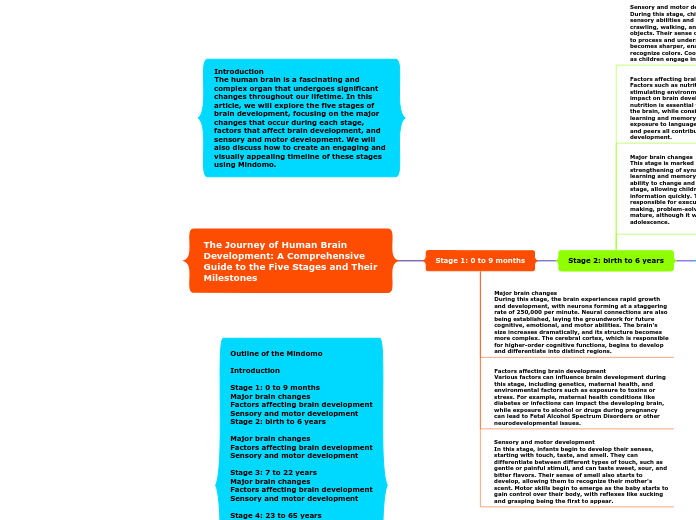The Journey of Human Brain Development: A Comprehensive Guide to the Five Stages and Their Milestones
Stage 1: 0 to 9 months
Major brain changes
During this stage, the brain experiences rapid growth and development, with neurons forming at a staggering rate of 250,000 per minute. Neural connections are also being established, laying the groundwork for future cognitive, emotional, and motor abilities. The brain's size increases dramatically, and its structure becomes more complex. The cerebral cortex, which is responsible for higher-order cognitive functions, begins to develop and differentiate into distinct regions.
Factors affecting brain development
Various factors can influence brain development during this stage, including genetics, maternal health, and environmental factors such as exposure to toxins or stress. For example, maternal health conditions like diabetes or infections can impact the developing brain, while exposure to alcohol or drugs during pregnancy can lead to Fetal Alcohol Spectrum Disorders or other neurodevelopmental issues.
Sensory and motor development
In this stage, infants begin to develop their senses, starting with touch, taste, and smell. They can differentiate between different types of touch, such as gentle or painful stimuli, and can taste sweet, sour, and bitter flavors. Their sense of smell also starts to develop, allowing them to recognize their mother's scent. Motor skills begin to emerge as the baby starts to gain control over their body, with reflexes like sucking and grasping being the first to appear.
Stage 2: birth to 6 years
Sensory and motor development
During this stage, children continue to refine their sensory abilities and develop motor skills, such as crawling, walking, and fine motor skills like grasping objects. Their sense of hearing improves, allowing them to process and understand speech, while their vision becomes sharper, enabling them to perceive depth and recognize colors. Coordination and balance also improve as children engage in various physical activities.
Factors affecting brain development
Factors such as nutrition, sleep, and exposure to stimulating environments can all have a significant impact on brain development during this stage. Proper nutrition is essential for supporting the rapid growth of the brain, while consistent sleep patterns help solidify learning and memory. Engaging in play and exploration, exposure to language, and interaction with caregivers and peers all contribute to a child's cognitive and social development.
Major brain changes
This stage is marked by the formation and strengthening of synapses, which are essential for learning and memory. The brain's plasticity, or its ability to change and adapt, is at its peak during this stage, allowing children to learn and absorb new information quickly. The prefrontal cortex, which is responsible for executive functions such as decision-making, problem-solving, and impulse control, begins to mature, although it will continue to develop throughout adolescence.
Stage 3: 7 to 22 years
Major brain changes
As individuals enter adolescence, the brain undergoes a period of pruning, where unnecessary neural connections are eliminated, and essential ones are strengthened. This process helps the brain become more efficient in processing information and supports the maturation of cognitive abilities. The prefrontal cortex, responsible for decision-making and impulse control, continues to develop, allowing for better judgment and planning.
Factors affecting brain development
Hormonal changes, peer influence, and exposure to risky behaviors can all impact brain development during this stage. Puberty brings about hormonal changes that can affect mood and cognition, while peer pressure may
lead adolescents to engage in risky behaviors that can have long-term consequences on brain development. Proper nutrition, adequate sleep, and a supportive environment are crucial in ensuring healthy brain development during this stage.
Sensory and motor development
Adolescents continue to hone their motor skills and coordination, often through sports or other physical activities. Fine motor skills become more precise, allowing for activities like playing musical instruments or engaging in art. As sensory abilities have reached maturity by this stage, adolescents can fine-tune their skills in areas like music, art, or sports by focusing on practice and mastery.
Stage 4: 23 to 65 years
Sensory and motor development
In adulthood, sensory and motor skills are generally well-developed, and individuals typically maintain these abilities throughout this stage. However, some decline may occur as a natural part of aging, such as reduced reaction time, decreased muscle strength, or a decline in visual or auditory acuity. Engaging in regular exercise and activities that challenge sensory and motor skills can help counteract these age-related changes.
Factors affecting brain development
Lifestyle choices, such as diet, exercise, and mental stimulation, can all influence brain health during this stage. Engaging in regular physical activity, maintaining a balanced diet rich in antioxidants and omega-3 fatty acids, and participating in cognitively stimulating activities can help preserve cognitive abilities and promote brain health.
Major brain changes
In adulthood, the brain's overall volume starts to decline slowly, with some areas, such as the hippocampus, experiencing more significant decreases. This decline can lead to subtle changes in memory and other cognitive functions. However, the brain's plasticity remains, allowing adults to continue learning and adapting to new information and experiences.
Stage 5: older than 65 years
Major brain changes
As individuals age, they may experience further declines in brain volume and cognitive abilities. Some individuals may also develop neurodegenerative diseases, such as Alzheimer's or Parkinson's, which can significantly impact brain function and daily life.
Factors affecting brain development
Genetics, overall health, and lifestyle choices all play a role in brain health during this stage. Maintaining a healthy lifestyle, managing chronic health conditions, and staying engaged in mentally stimulating activities can all contribute to preserving brain function in older adults.
Sensory and motor development
Sensory and motor skills may decline with age, making it crucial for older adults to engage in activities that promote physical and mental health. Regular exercise, such as walking, swimming, or yoga, can help maintain muscle strength, balance, and coordination. Participation in hobbies or social activities that challenge cognitive and sensory abilities, like playing chess or attending cultural events, can support continued brain health.
